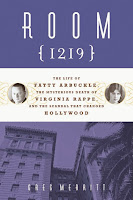Long before O.J. Simpson, Hugh Grant, Pee-Wee Herman or any of today's seemingly weekly Twitter-promoted scandals, Roscoe "Fatty" Arbuckle's trial for manslaughter set the standard for celebrity impropriety and captured a nation's attention while ruining one man's career and also reshaping a burgeoning film industry.Greg Merritt's Room 1219: The Life of Fatty Arbuckle, The Mysterious Death of Virginia Rappe, and the Scandal That Changed Hollywood does an excellent job of connecting these various themes within its 350 pages.
When one looks back at the early stars of silent film, there are some who immediately come to mind, such as Chaplin and Keaton, while others have been left behind. Fatty Arbuckle, despite being one of the biggest (and not just in size) comedy stars of the time, is mostly remembered for the night that he was accused of manslaughter when rising actress Virginia Rappe died four days after attending a party that Arbuckle hosted in a San Francisco hotel. Various explicit rumors have surfaced over the years and while it seems likely that intercourse may have occurred (or at least that was the intention) the details about what happened while Arbuckle and Rappe were alone in a room are disagreed upon.
But Merritt's intention with this book is clearly much greater than discussing whether Arbuckle is guilty or whether Rappe was just a young starlet trying to sleep her way to the top. The most interesting parts of this book discuss the creation of young Hollywood and its new film industry. Like many of his colleagues, Arbuckle entered the film industry from Vaudeville, but contrary to what one might presume now, this was actually considered a step down since working in the film industry was not considered very prestigious. Arbuckle and his colleagues helped create and develop the form (and industry) so that it moved from anonymous actors to superstars who were able to create their own studios.
The early parts of the book show us Arbuckle's youth and eventual migration to Hollywood and as one might guess, it covers the three manslaughter trials in great detail. The book also tells us how this and concurrent scandals tarnished Hollywood's image, eventually prompting Hollywood to create its own "morality czar" Will Hays, whose Hays Code brought the studios in line by requiring them to avoid certain subjects. But beyond being a fascinating history of early film and Arbuckle's career, the book is also a tragedy, as we see how one man's career was ruined by a public voracious for scandal, despite being found not guilty for the crimes for which he was accused.
There were no winners in this case. Rappe died at the age 30, having had an interesting string of careers up to the point of trying to make it as an actress. The trials dried up all of Arbuckle's money but eventually, despite being banned from working in the film industry for a number of years, he went on to direct a number of films under an assumed name and eventually resumed acting in talkies. He would act in six of them before dying unexpectedly at the age of 46. It's hard not to see echoes of how he was treated in other Hollywood scandals throughout the years. I have some quibbles with the structure of the book, since for some reason the author skips back and forward in time in setting up the early parts of the story, and by the time of the third trial I found it hard to keep up with minutiae. But certainly any fan of early Hollywood should find something to enjoy in this worthwhile book.
Check our catalog


No comments:
Post a Comment
We review all comments and reserve the right to remove comments based on: profanity, irrelevance, spam, personal attacks and anything else contrary to our guidelines.